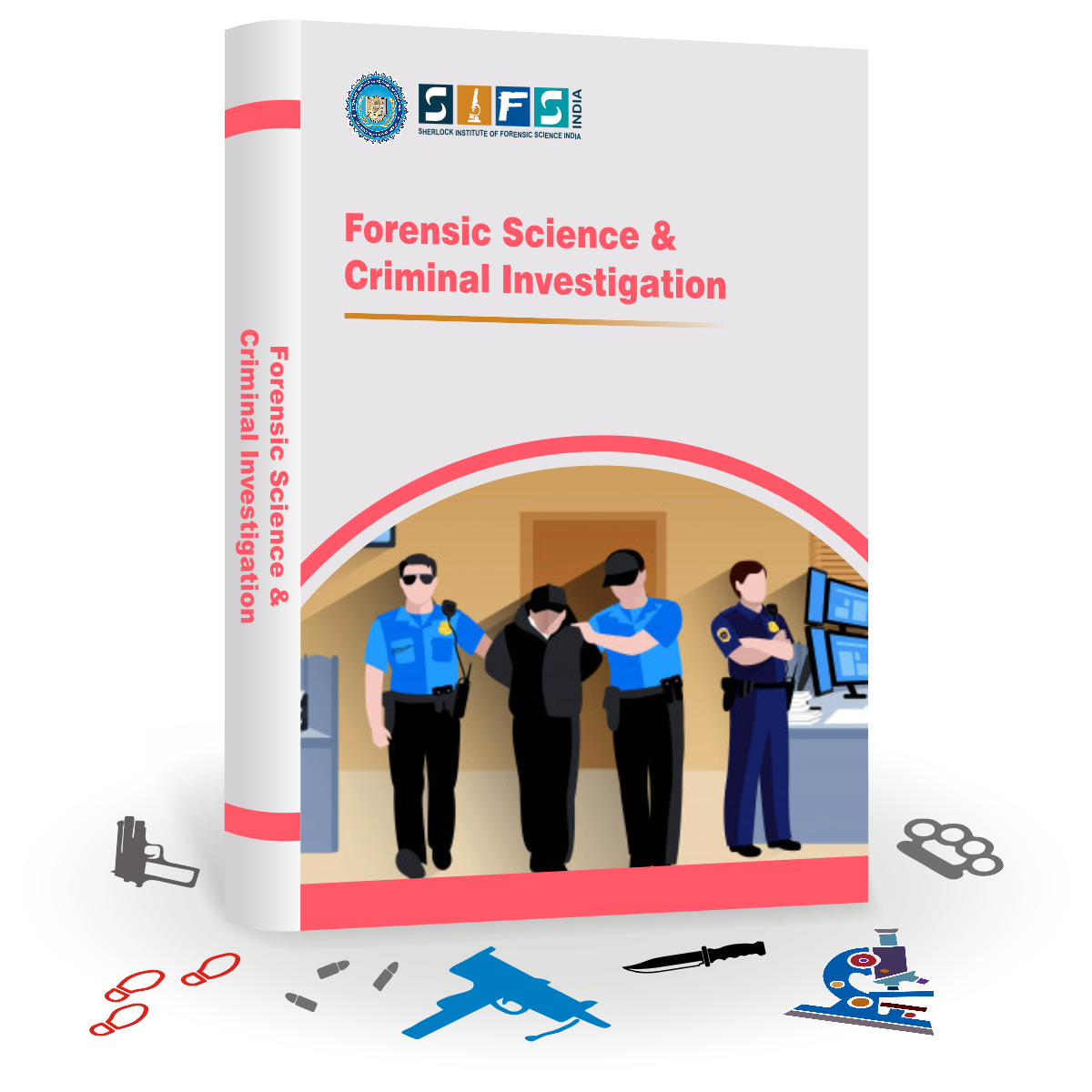MODULE 1 – INTRODUCTION TO FORENSIC SCIENCE
This module will equip you with the fundamentals, history, basic principles, and significance of forensic science, institutional structures, government and private laboratories, and the role and uses of this science in the criminal justice system. You will also learn about the chain of custody, i.e., the collection, preservation, inspection, evaluation, and reporting of evidence, along with a basic understanding of the different forensic science domains and the legal context associated with them.
MODULE 2 – CRIME SCENE INVESTIGATION AND MANAGEMENT
In this module, you will learn about types of crime scenes (indoor and outdoor), crime scene securing and recording methods like note-making, sketching, photography, and videography, the role of the first respondent and forensic scientist at the crime scene, and the importance of Locard’s Exchange Principle. You will also gain knowledge about types of evidence (physical, chemical, biological, and testimonial), evidence searching methods (spiral search, grid search, strip search, zone search), techniques to collect, preserve, and package evidence, crime scene reconstruction, and courtroom presentation of the evidence.
MODULE 3 – PHYSICAL EVIDENCE COLLECTION AND PRESERVATION
This module focuses on modern crime scene investigation methods, different types of evidence, physical evidence searching methods, collection, preservation, and packaging techniques of different types of evidence, along with steps to be followed in transferring that evidence to the laboratories for further investigation. You will also learn about the issues associated with evidence admissibility in court and what type of evidence can be presented during legal proceedings.
MODULE 4 – FINGERPRINT IDENTIFICATION
This module will equip you with the history, principles, and fundamentals of fingerprint identification, types of fingerprint patterns (arch, loop, and whorl), ridge characteristics, and techniques to record fingerprints. You will also learn about the Henry System of Classification, types of fingerprints found at the crime scene (latent, patent, and plastic prints), and methods of fingerprint lifting and development (physical, fuming, and chemical). This module also introduces you to other impressions like foot, shoe, ear, lip, and palm prints.
MODULE 5 – QUESTIONED DOCUMENT EXAMINATION
This module will focus on the principles and problems of questioned document examination along with their handling methods, document and handwriting examination techniques, natural variations in handwriting and factors affecting it, types of signature forgeries, examination of different types of documents (altered, indented, charred, etc.), and ways to decipher secret handwriting. You will also learn about typewritten document examination, holographic and allographic documents, counterfeit currency, digital signatures, and anti-money laundering documents.
MODULE 6 – COMPUTER AND CYBER CRIME
In this module, you will learn about the history and fundamentals of cyber crimes, types of cyber crime (phishing, cyberstalking, ransomware, DoS, credit card fraud, identity theft, etc.), categories of cyber crime (individual, property, and government), the significance of digital evidence and its types, and steps to be followed while searching for and seizing digital evidence. The module also highlights the cyber crime investigation techniques, tools used for evidence analysis and verification, and precautions to take to enhance the chances of evidence admissibility in court.
MODULE 7 – FORENSIC BIOLOGY
In this module, you learn about the significance and history of forensic biology and hair as evidence, including its anatomical structure, stages of growth, and identification techniques. The module also focuses on botanical evidence identification, like those of pollen grains, wood, diatoms, and leaves. You will be introduced to the concept of DNA profiling, sources of DNA, DNA extraction and evaluation techniques, and the forensic significance of DNA profiling, along with step-by-step procedures from procuring evidence to their laboratory examination.
MODULE 8 – CRIMINAL INVESTIGATION TECHNIQUES
In this module, you will learn about criminal investigation techniques, modus operandi, criminal profiling (the art of creating psychological profiles of criminals), and portrait parley (the science of creating composite sketches). The module also focuses on advanced crime detection technologies like polygraph (lie detector test), narco analysis, and brain fingerprinting to extract crucial information from the suspects. Finally, the concepts of voice stress analysis and speaker profiling are covered to decipher vocal clues for investigation.
MODULE 9 – FORENSIC TOXICOLOGY
This module focuses on toxicology introduction and its history, the evolution of toxicology, the fundamental principles of toxicology, the classification of poisons based on their properties and effects, and poisons-action mechanism that discusses the working of poison within the human body. You will also learn about the collection and preservation of toxicological exhibits, medico legal aspects and post-mortem examination, poisoning incident management, including the handling of affected individuals, and the significance of toxicological findings in criminal and medical investigations.
MODULE 10 – FORENSIC PHYSICS
This module focuses on different types of evidence, like glass, including its historical significance, types and composition, glass fracture, and forensic examination; soil, including its types, composition, and forensic examination; paint, including its history, types, and forensic analysis and examination techniques; and fiber, including its classification and forensic analysis and examination. You will also learn about the restoration of obliterated marks, types of marks, restoration principles and techniques, tire and skid marks, casting, lifting, and forensic examination of tire impressions. Finally, the concept of a tool mark, along with its types, history, and examination methods, is covered.
MODULE 11 – FORENSIC BALLISTICS
In this module, you will learn about the history, development, and classification of firearms based on their characteristics and uses, types of ammunition (like projectiles, primers, propellents, cartridges, wads, and percussion cups), types of ballistics, projectile behavior in flight, wound ballistics, and the concept of gunshot injuries. The module also focuses on firearm examination, microscopic examination (inspecting firearm components at a microscopic level), chemical examination using chemical analysis techniques, and instrumental examination, which includes in-depth analysis and comparison of firearms and ammunition.
MODULE 12 – FORENSIC PHOTOGRAPHY
This module covers forensic photography essentials, including its historical evolution, basic principles, photography techniques, components, types of photography (close-up, mid-range, and overall photography), the role of each type in forensic documentation, systematic photography of crime scenes, and document and fingerprint photography. You will also learn how photographs aid in the examination and documentation of injuries and post-mortem cases. The module concludes by shedding light on modern developments in photography, with special emphasis on the impact of digital cameras and digital photographic tools, illustrating how technology has revolutionized forensic photography.
MODULE 13 – FORENSIC SEROLOGY
In this module, you will gain insights about forensic examination of body fluids and tissues, the structure and functioning of various body fluids and tissues, historical evolution, examination of blood and blood stains, blood evidence collection, analysis, and interpretation. The module also covers examination of other body fluids like semen, saliva, urine, vomitus, fecal matter, vaginal fluid, and sweat. This module will equip you with the knowledge and skills required to analyze and interpret a wide range of body fluids and tissues.
MODULE 14 – DRUG & ALCOHOL ABUSE
This module focuses on forensic pharmacology and the investigation of drug-related incidents, historical developments in this field, categorization of drugs (narcotics, stimulants, depressants, hallucinogens, etc.), techniques used to identify and analyze drugs, alcohol abuse and its effects on individuals, collection, preservation, and identification of alcohol, and methods to maintain evidence reliability. You will also learn about blood alcohol concentration (BAC) to determine an individual's level of intoxication. Finally, the module explores breath analyzers and the technology and techniques used to assess a person's breath for alcohol content.
MODULE 15 – FORENSIC PSYCHOLOGY
In this module, you will learn about how psychology and the legal system relate to each other, historical evolution, forensic psychiatry, and the role of psychologists within the legal framework, including working as trail consultants, expert witnesses, evaluators, and criminal investigators. The module also focuses on types of personality disorders (cluster A, cluster B, and cluster C), forensic lie detection techniques, and advanced psychological techniques like brain fingerprinting and narco analysis. Finally, you will gain insights about civil and criminal responsibility legal considerations while dealing with mentally ill individuals, along with presenting your psychological findings and assessments in courtroom settings.
MODULE 16 – FORENSIC ANTHROPOLOGY
The module focuses on the history and contributions of forensic anthropology in deciphering mysteries from human remains, the morphological characteristics of bone and skull, human skeletal anatomy, and individualization through bones to determine the individual’s identity. You will also learn about the art and science of reconstructing facial features from skeletal remains, techniques to identify skeletal remains in mass disaster cases, and the role forensic anthropology plays in solving crimes, identifying missing persons, and providing justice.
MODULE 17 – FORENSIC ENTOMOLOGY
In this module, you will learn about the role of forensic entomology in solving cases related to decomposed bodies, the history of this study, the study of common insects that colonize a decaying human body, the body decomposition process, factors affecting body decomposition, and the significant role terrestrial and aquatic insects play during forensic investigations to determine the time since death. The module also focuses on applications of forensic entomology in utilizing insect evidence in medico-legal investigations and uncovering hidden clues within decomposing bodies.
MODULE 18 – FORENSIC MEDICINE
In this module, you will learn about the role of forensic medicine in cases of injuries, death, and sexual offenses, its historical development, the classification of injuries, including ante-mortem and post-mortem injuries, the aging of injuries and artificial injuries, and the study of stages of death and related processes. The module also focuses on methods and procedures used to determine the cause and manner of death within a legal framework, techniques to examine cases of sexual offence, and the concepts of foeticide and infanticide, along with legal considerations associated with fetal and infant deaths.
MODULE 19 – WILDLIFE FORENSIC
This module explores the world of wildlife forensic science, history, protected and endangered animal species, vulnerabilities endangered species are prone to, conventional and modern tools and techniques to identify and examine physical evidence for tracking wildlife crimes, and methods to identify and track animals by their paw prints. You will also learn about the significance of wildlife census methods to determine population sizes, ecological health, and methods to contribute to the conservation of our natural world.
MODULE 20 – FORENSIC ODONTOLOGY
In this module, you will gain insights about forensic dentistry, its history and contributions, the role it plays in personal and criminal identification, the structure and characteristics of human teeth, types of teeth and their functions, Gustfson’s Index method of age estimation that estimates the age of an individual based on dental features, human bite mark characteristics, distortion of bite marks, and the role forensic dentistry plays in mass disaster cases in identifying victims. Finally, you will learn about the role and significance of dental anomalies in personal identification.
MODULE 21 – ARSON & EXPLOSIVE
This module focuses on arson investigation and explosives analysis, an overview of the chemistry of fire, and arson case investigation (including the location of the point of origin of fire, searching for accelerants, collecting and preserving arson evidence, and forensic examination of arson evidence). After this, you will learn about explosives, their historical background, types of explosives, various substances used to create explosive materials, explosive devices, investigation methods of bombing scenes (pre- and post-bombing scenes), analysis of improvised explosive devices, and finally analysis of explosives to identify explosive material used.





